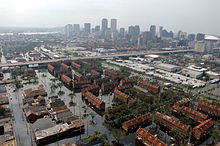Property
Main article: Property insurance
Property insurance provides protection against risks to property, such as fire, theft or weather damage. This may include specialized forms of insurance such as fire insurance, flood insurance, earthquake insurance, home insurance, inland marine insurance or boiler insurance. The term property insurance may, like casualty insurance, be used as a broad category of various subtypes of insurance, some of which are listed below:- Aviation insurance protects aircraft hulls and spares, and associated liability risks, such as passenger and third-party liability. Airports may also appear under this subcategory, including air traffic control and refuelling operations for international airports through to smaller domestic exposures.
- Boiler insurance (also known as boiler and machinery insurance, or equipment breakdown insurance) insures against accidental physical damage to boilers, equipment or machinery.
- Builder's risk insurance insures against the risk of physical loss or damage to property during construction. Builder's risk insurance is typically written on an "all risk" basis covering damage arising from any cause (including the negligence of the insured) not otherwise expressly excluded. Builder's risk insurance is coverage that protects a person's or organization's insurable interest in materials, fixtures and/or equipment being used in the construction or renovation of a building or structure should those items sustain physical loss or damage from an insured peril.[22]
- Crop insurance may be purchased by farmers to reduce or manage various risks associated with growing crops. Such risks include crop loss or damage caused by weather, hail, drought, frost damage, insects, or disease.[23]
- Earthquake insurance is a form of property insurance that pays the policyholder in the event of an earthquake that causes damage to the property. Most ordinary home insurance policies do not cover earthquake damage. Earthquake insurance policies generally feature a high deductible. Rates depend on location and hence the likelihood of an earthquake, as well as the construction of the home.
- Fidelity bond is a form of casualty insurance that covers policyholders for losses incurred as a result of fraudulent acts by specified individuals. It usually insures a business for losses caused by the dishonest acts of its employees.

Hurricane Katrina caused over $80 billion of storm and flood damage
- Flood insurance protects against property loss due to flooding. Many insurers in the US do not provide flood insurance in some parts of the country. In response to this, the federal government created the National Flood Insurance Program which serves as the insurer of last resort.
- Home insurance, also commonly called hazard insurance or homeowners insurance (often abbreviated in the real estate industry as HOI), provides coverage for damage or destruction of the policyholder's home. In some geographical areas, the policy may exclude certain types of risks, such as flood or earthquake, that require additional coverage. Maintenance-related issues are typically the homeowner's responsibility. The policy may include inventory, or this can be bought as a separate policy, especially for people who rent housing. In some countries, insurers offer a package which may include liability and legal responsibility for injuries and property damage caused by members of the household, including pets.[24]
- Landlord insurance covers residential and commercial properties which are rented to others. Most homeowners' insurance covers only owner-occupied homes.







